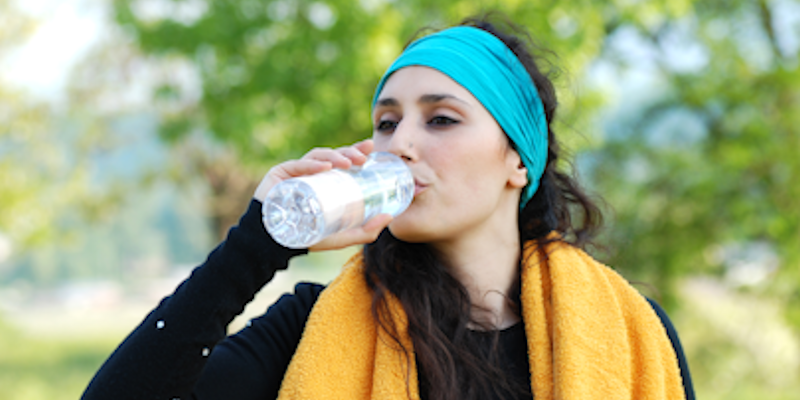Staying Hydrated While Exercising
Did you know that 60% of your body weight is water? And did you know that when you exercise, fluid gets lost through your skin through sweat, and through your lungs while breathing? This is why it’s vital to drink fluids while exercising – if you don’t, you can become dehydrated and increase the risk of a heat-related injury.
If you do become dehydrated, the volume of blood that circulates through your body decreases, which can lead to exhaustion and in turn affect your performance. In addition, the amount of blood that is pumped with your heart beat decreases and your exercising muscles will not receive enough oxygen.
Research shows that losing as little as 2% of your body weight can have a negative effect on your performance. So how can you tell if you are becoming dehydrated? The easiest and quickest way is to check the color of your urine. Urine that is dark gold indicates that you are dehydrated. Urine that is lighter in color indicates that you are hydrated. Another method is to weigh yourself before and after you exercise – for every pound that you lost while exercising, you should drink three cups of fluid to become hydrated again.
There are many ways to prevent dehydration, but the best way is to consume plenty of fluids before, during, and after exercising. Many times, people wait until they are thirsty to start consuming fluids; however, thirst is not an accurate indicator of how much fluid you have lost. If you wait until you are feeling thirsty to quench your thirst, you are most likely already dehydrated. In addition, if you only consume enough fluids until you no longer feel thirsty, you may still be dehydrated.
What type of fluids should you consume? Here are some tips:
- Avoid carbonated beverages. These can cause GI distress and may also decrease the volume of fluid consumed.
- Avoid beverages that contain caffeine, alcohol, and energy drinks.
- Unless you are participating in intense training and long workouts, choose a beverage that contains just a small amount of sodium and electrolytes. The sodium can be helpful for faster absorption and replacement of sweat loss. Sports drinks tend to contain higher amounts of sodium and electrolytes, which would be more beneficial for intense training and long workouts.
- Make sure your chosen beverage is palatable and tastes good. If you are competing, do not wait until competition day to experiment with a beverage you’ve never had before.
By keeping these tips in mind, you’ll be sure to have a much healthier and successful workout!

